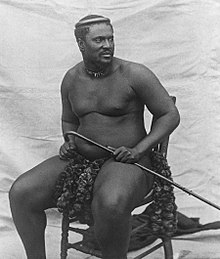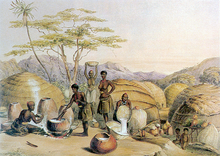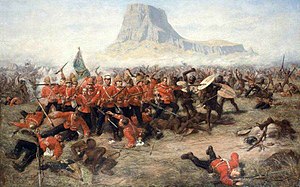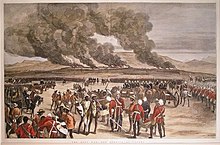Anglo-Zulu War
Following the passing of the British North America Act of 1867 forming a federation in Canada, Lord Carnarvon thought that a similar political effort, coupled with military campaigns, might lead to a ruling white minority over a black majority in South Africa.This would yield a large pool of cheap labour for the British sugar plantations and mines, and was intended to bring the African Kingdoms, tribal areas, and Boer republics into South Africa.By the 1850s, the British Empire had colonies in southern Africa bordering on various Boer settlements, native African kingdoms such as the Zulus and the Basotho and numerous indigenous tribal areas and states.Matters were brought to a head when three sons (led by Mehlokazulu kaSihayo) and a brother of the Zulu inkosi Sihayo organized a raid into Natal and carried off two women who were under British protection.The discovery of diamonds in 1867 near the Vaal River, some 550 mi (890 km) northeast of Cape Town, ended the isolation of the Boers in the interior and had a significant effect on events.The discovery triggered a diamond rush that attracted people from all over the world, which turned Kimberley into a town of 50,000 within five years and drew the attention of British imperial interests.Bartle Frere wasted no time in putting the scheme forward and manufacturing a casus belli against the Zulu by exaggerating the significance of a number of recent incidents.Earlier in October 1877, Shepstone had attended a meeting with Zulu leaders near the Blood River to resolve the land dispute between the Zulus and the Boers.There were incidents involving Zulu paramilitary actions on either side of the Transvaal/Natal border, and Shepstone increasingly began to regard King Cetshwayo, as having permitted such "outrages", and to be in a "defiant mood".Bishop Colenso's concern about the misleading information that was being provided to the Colonial Secretary in London by Shepstone and the Governor of Natal prompted him to champion the cause of the Zulus against Boer oppression and official encroachments."The fact is," wrote Sir Michael Hicks Beach, who was to replace Carnarvon as Secretary of State for the Colonies, in November 1878, "that matters in Eastern Europe and India ... wore so serious an aspect that we cannot have a Zulu war in addition to other greater and too possible troubles."Questions were also raised as to the validity of the documents signed by the Zulus concerning the Utrecht strip; in 1869 the services of the lieutenant-governor of Natal, then Robert William Keate, were accepted by both parties as arbitrator, but the attempt then made to settle disagreements proved unsuccessful.Sir Theophilus Shepstone, whom Cetshwayo regarded as his friend, had supported him in the border dispute, but in 1877 he led a small force into the Transvaal and persuaded the Boers to give up their independence.I have sent a message to the Zulu King to inform him of this act of violence and outrage by his subjects in Natal territory, and to request him to deliver Up to this Government to be tried for their offence, under the laws of the Colony, the persons of Mehlokazulu and Bekuzulu the two sons of Sirayo who were the leaders of the party.Frere wrote to Hicks Beach, 30 September 1878: Apart from whatever may be the general wish of the Zulu nation, it seems to me that the seizure of the two refugee women in British territory by an armed force crossing an unmistakable and well known boundary line, and carrying them off and murdering them with contemptuous disregard for the remonstrances of the Natal policemen, is itself an insult and a violation of British territory which cannot be passed over, and unless apologised and atoned for by compliance with the Lieutenant Governor's demands, that the leaders of the murderous gangs shall be given up to justice, it will be necessary to send to the Zulu King an ultimatum which must put an end to pacific relations with our neighbours.[22]In reply, in at least three dispatches, 17 October, 21 November and 18 December, Hicks Beach emphatically states that war is to be avoided and a British invasion of Zululand prohibited.With the annexation of the Transvaal, Britain had also to deal with Mbelini and because Frere was convinced that the bandit chief was in the pay of the Zulu king, his surrender was included in the ultimatum.[25]Frere has been accused of chicanery by taking deliberate advantage of the length of time it took for correspondence to pass between South Africa and London to conceal his intentions from his political masters or at least defer giving them the necessary information until it was too late for them to act.The letter only arrived in London on 16 November and by then messengers had already been despatched from Natal to the Zulu king to request the presence of a delegation at the Lower Tugela on 11 December for the purpose of receiving the Boundary Commission's findings.Had Hicks Beach then sent off a telegraph forbidding any action other than the announcement of the boundary award, it might have arrived in South Africa just in time to prevent the ultimatum being presented.In January 1879, Hicks Beach wrote to Bartle Frere: I may observe that the communications which had previously been received from you had not entirely prepared them (Her Majesty's Government) for the course which you have deemed it necessary to take.The representations made by Lord Chelmsford and yourself last autumn as to the urgent need of strengthening Her Majesty's forces in South Africa were based upon the imminent danger of an invasion of Natal by the Zulus, and the inadequate means at that time at your disposal for meeting it.In order to afford protection to the lives and property of the colonists, the reinforcements asked for were supplied, and, in informing you of the decision of Her Majesty's Government, I took the opportunity of impressing upon you the importance of using every effort to avoid war.On 22 January the centre column, which had advanced from Rorke's Drift, was encamped near Isandlwana; on the morning of that day Lord Chelmsford split his forces and moved out to support a reconnoitering party, leaving the remaining 1,300 men of the No.In the battle's aftermath, a party of some 4,000 Zulu reserves mounted an unauthorised raid on the nearby British Army border post of Rorke's Drift and were driven off after 10 hours of ferocious fighting on 23 January.On the 29th a column under Lord Chelmsford consisting of a total of 5,670 men (3,390 Europeans and 2,280 Africans) marched to the relief of Eshowe, with entrenched camps being formed each night.Nevertheless, Chelmsford had a pressing reason to proceed with haste – Sir Garnet Wolseley was being sent to replace him, and he wanted to inflict a decisive defeat on Cetshwayo's forces before then.With yet more reinforcements arriving, soon to total 16,000 British and 7,000 Native troops, Chelmsford reorganised his forces and again advanced into Zululand in June, this time with extreme caution building fortified camps all along the way to prevent any repeat of Isandlwana.Chelmsford was not open to negotiations, as he wished to restore his reputation before Wolseley relieved him of command, and he proceeded to the royal kraal of Ulundi, intending to defeat the main Zulu army.Following the conclusion of the Anglo-Zulu War, Bishop Colenso interceded on behalf of Cetshwayo with the British government and succeeded in getting him released from Robben Island and returned to Zululand in 1883.










Battle of Isandlwana17th LancersUlundiKambulaRorke's DriftZulu KingdomSouth AfricaBritish EmpireNatal ColonyBenjamin DisraeliHenry Bartle FrereLord ChelmsfordGarnet WolseleyCetshwayo kaMpandeNtshingwayo KhozaDabulamanzi kaMpandeGatling gunsSihayo's KraalZungwini MountainInyezaneIsandlwanaEshoweIntombeHlobaneGingindlovuZungeni MountainScramble for AfricaSouth Africa (1880)Tunisia (1881)Sudan (1881)Egypt (1882)Wassoulou (1883)Madagascar (1883)Equatoria (1886–89)Somalia (1888–1924)Eritrea (1889)Congo (1895)Dahomey (1890)Mashonaland (1890)Katanga (1891−92)Dahomey (1892)Matabeleland (1893)Morocco (1893–94)Wassoulou (1894)Ashanti (1895) South Africa (1895)Ethiopia (1896)Matabeleland (1896)Zanzibar (1896)Benin (1897)Wassoulou (1898)Chad (1898)Fashoda (1898)South Africa (1899)Somaliland (1900)Aro (1901)Angola (1902)Namibia (1904)Tanganyika (1905)Morocco (1905–06)South Africa (1906)Morocco (1907–34)Mufilo (1907)Morocco (1909)Ouaddai (1909)Morocco (1911)Libya (1911–12)South Africa (1914)Darfur (1916)British North America Act of 1867Lord CarnarvonBoer republicsBartle FrereHigh CommissionerSouth African RepublicZululandZulu KingCetshwayofaminesdiplomatic misadventuresunpopular warssouthern AfricaBasothoCape ColonyAnglo–Dutch Treaty of 1814Cape TownRepublic of NataliaVaal Riverdiamond rushKimberleyWest GriqualandSecretary of State for the ColoniesOrange Free StateTransvaal Republicdominioncasus belliTheophilus ShepstonePaul KrugerJohn ColensoLangalibaleleRobben IslandBritish Prime MinisterSir Michael Hicks BeachShaka ZuluDukuzainDunasDingane kaSenzangakhonaPretoriusBattle of Blood RiverMpande kaSenzangakhonaVoortrekkersMpandeSwazilandBattle of NdondakusukaPongola RiverDinganeSwazisLydenburgBoer commando unitRobert William Keateage-setassegaiHenry BulwerultimatumSihayo kaXongotwo men were detained
